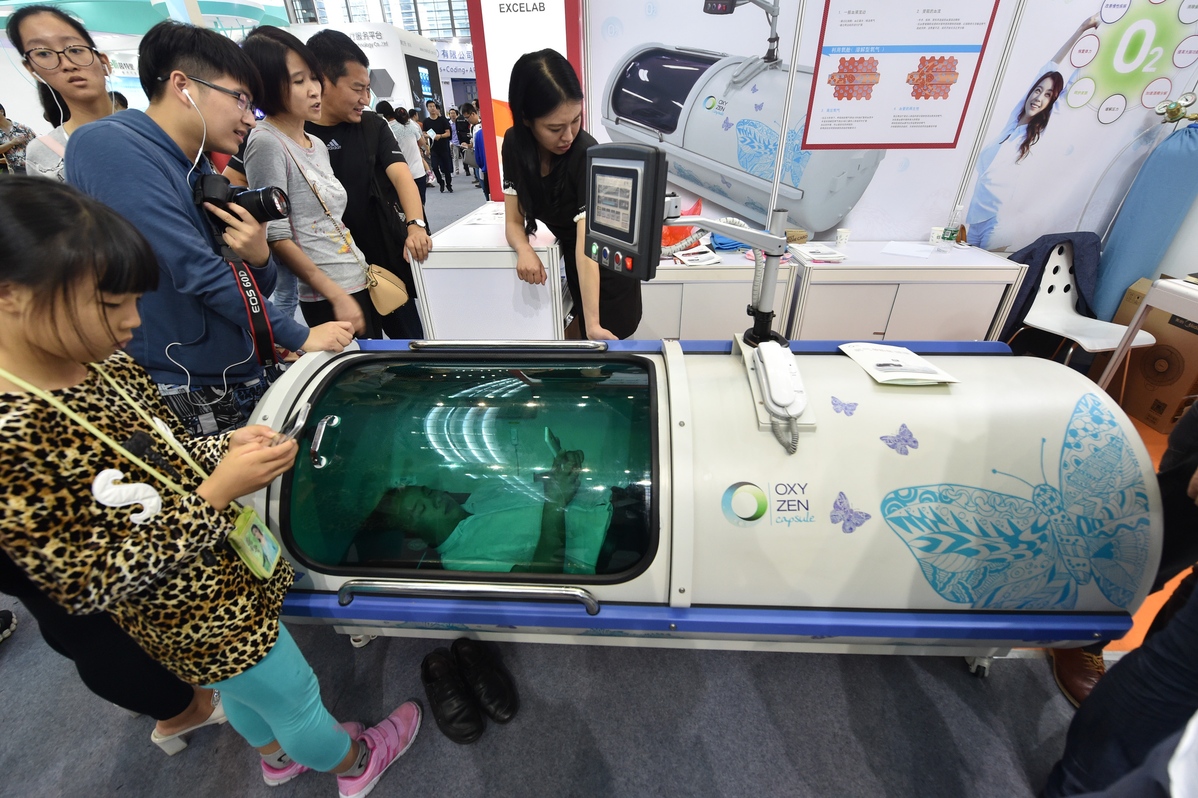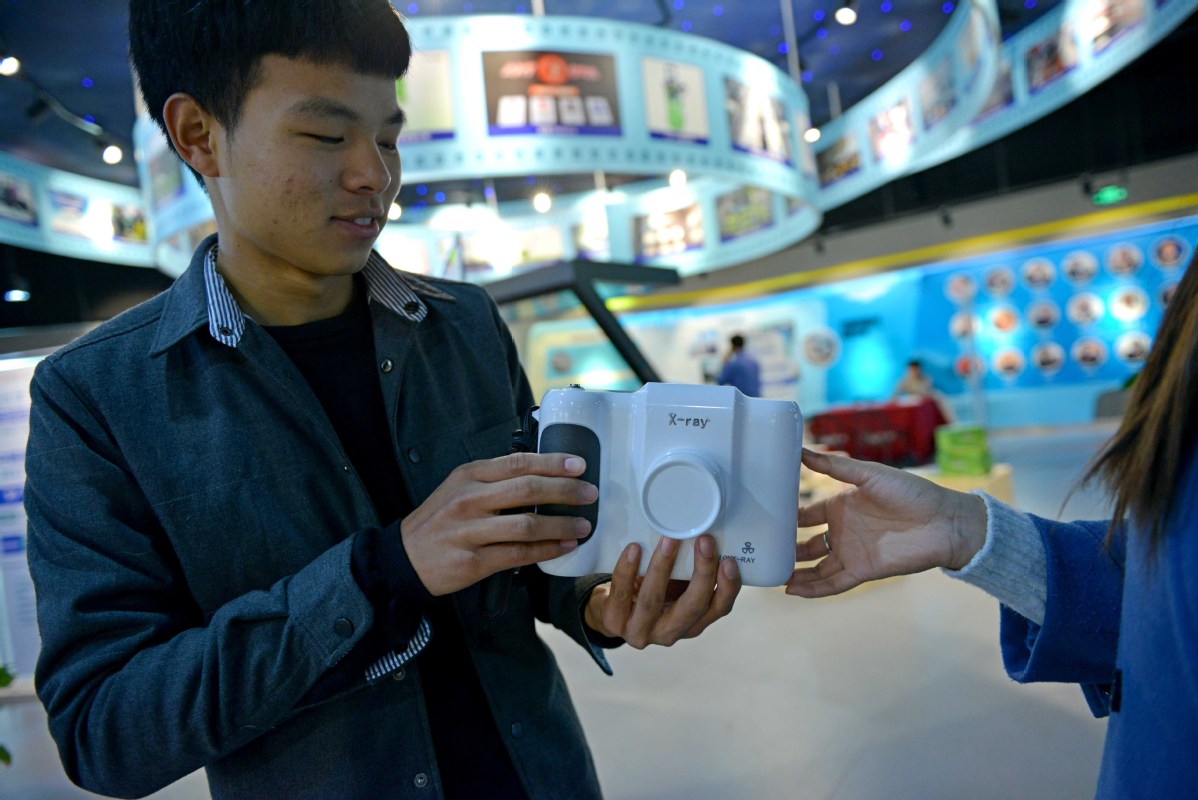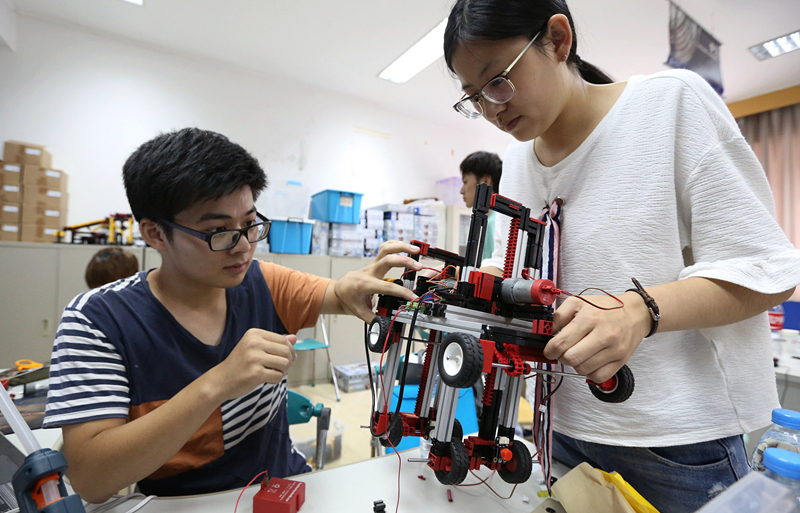Exchanges promoted between China, Japan and the ROK
Closer cooperation between China, Japan and the ROK, which began in 1999, is significant in building an open global economy.
On February 14, Linc, a two-year-old Tokyo company offering foreign students - Chinese in particular - online education to help them find places at Japan's top universities, raised funding of 100 million yen (US$905,635) from two Japanese investment firms.

Together with two young Chinese, the then-25-year-old Zhong Siyao founded the company in 2016 after graduating from Keio University and working at a large Japanese company. He is now Linc's chief executive officer.
At a seminar in Tokyo on July 3 for startups, established companies and public policymakers from China, Japan and the Republic of Korea to network, Zhong was not hesitant in expressing confidence in his young company's future.
Like Zhong, Kim Jeongyun from the Republic of Korea also studied in Japan - majoring in mechanical engineering. He is now planning manager at the Reset Company in his home country, which produces robotic cleaners to remove snow from roofs. The company is setting its sights on the market in Japan, where a rapidly aging population finds it difficult to perform such tasks.
Kim said his company is still working hard to win Japanese customers, who consider their country's products to be the world's best. But he wants to give it a try.
Amid intensifying trade disputes triggered by US President Donald Trump, the networking meeting in Tokyo was the latest event held by the Trilateral Cooperation Secretariat to promote exchanges between the three East Asian countries to benefit them all.
The secretariat was founded in 2011 for the efficient promotion and management of cooperation projects.
Lee Jong-heon, the secretariat's secretary-general, said closer cooperation between China, Japan and the ROK, which began in 1999, is significant in building an open global economy. The trilateral trade volume reached more than US$640 billion last year, a year-on-year rise of 11 percent.
Policymakers from the three countries shared their experience in recruiting talent and encouraging startups.
In Beijing, the Zhongguancun technology hub welcomes more than 20,000 new startups annually.
More than 100,000 companies have registered in the tech hub, according to Zhang Guoqing, chairman of the Z-Park + Strategic Emerging Industry Talent Development Center.
In its second annual Top Tech Cities in the World ranking report released in November, Expert Market, a business resources company, gave the Zhongguancun tech hub top spot because of its favorable climate for early-stage funding and Beijing's affordable cost of living.

Zhongguancun beat Silicon Valley to be ranked the top technology hub in the world.
Joining Japanese Prime Minister Shinzo Abe and ROK President Moon Jae-in for a trilateral meeting in Tokyo in May, Chinese Premier Li Keqiang said the three countries, which are three large global economies and key mutual partners in trade and economic cooperation, shoulder great responsibilities in boosting regional development, guiding regional economic integration and safeguarding regional peace and stability.
Li said strengthening trilateral cooperation not only meets the needs of the three countries, but also the expectations of the region and the international community.
The three countries have pledged to accelerate negotiations for a trilateral free trade agreement and to achieve the Regional Comprehensive Economic Partnership at an early date.
The partnership is a proposed free trade agreement between the 10 member states of the Association of Southeast Asian Nations and Australia, China, India, Japan, South Korea and New Zealand - the six Asia-Pacific states with which ASEAN has free trade agreements.
Li also suggested that China, Japan and the ROK join hands to promote the building of an East Asian Economic Community, and stand together even more steadfastly to safeguard the rules-based multilateral free trade system.
He said the three countries can cooperate within a "China-Japan-ROK plus X" framework, with the "X" signifying business approaches beyond the three.
The ROK has said it will seek to increase cooperation with the Asian Infrastructure Investment Bank, according to Yonhap News Agency.
During the bank's annual meeting in Mumbai, India, in June, ROK Deputy Finance Minister Ko Hyungkwon met with the bank's top executives, including its President Jin Liqun, to discuss mutual cooperation.
Seoul has called for greater participation by private investors in the bank's massive infrastructure development program.
The ROK joined the AIIB, the China-led multinational lender set up in 2015 to fund infrastructure projects in Asia, as one of its founding members.
As for European Unionlike integration in East Asia, Lee said it will take time. The environment China, Japan and the ROK are facing is different to that in Europe.
"First of all, from the geopolitical perspective, China is a continental power, Japan is a sea power, and the ROK is a peninsular nation," Lee said. "EU nations are on one continent."
Geographic closeness and cultural similarities are the strong points of the three East Asian countries, Lee said.
"But we should take other factors, such as different geopolitical positions, or strategic perspectives and historical issues, into consideration," he said.
Lee said each of the three countries has its own strengths based on their competitive advantages. By combining their strengths, they can bring significant advantages to their populations.

Geographically, the ROK is situated in the center. Its capital, Seoul, lies approximately on the midpoint of a line joining the capitals of China and Japan, Beijing and Tokyo.
Economically, the three economies are complementary.
They are all outward looking and their growth depends on their economic relations with their two neighbors.
They trade heavily among themselves, and Japan and the ROK have invested in China, with many of their companies setting up subsidiaries or joint ventures in the country.
China is the ROK's biggest trading partner and overseas investment market, while the ROK is China's fourth-biggest trading partner.
In the first five months of this year, the trading volume between the two economies topped US$122 billion, up by 9.2 percent year-on-year.
Japanese exports to China rose to 14.9 trillion yen last year, a 20.5 percent increase over the previous year, marking the highest figure since statistics were first recorded in 1979, according to the Japanese Finance Ministry.
However, people in East Asia are worrying about the impact the protectionist policies being adopted by the Trump administration will have on economic cooperation in the region.
The US started to impose 25 percent tariffs on US$34 billion worth of Chinese imports on July 6.
The Japanese government estimates at least US$6.9 billion worth of goods from Japanese companies in China will be targets of the new US tariffs, as they are earmarked for export to the US, according to Kyodo News Agency.
The US is Japan's top destination for its exports, followed by China.
Kyodo said that if the trade dispute between China and the US worsens to a chronic level, Japanese companies will likely move their production sites from China to Southeast Asia to safeguard their earnings.
But Chinese companies are still pushing for cross-border cooperation.
Zhang Linfeng, vice-president of ZTE, the Chinese multinational telecommunications equipment and systems company, said China, Japan and the ROK are complementary.
He said Japan leads in processing and the quality of parts, and ZTE, which is strong in research and development, has plenty of patents.
Meanwhile, ROK companies are well-known for their innovation.
"Businesses in the three countries should have more exchanges and join hands to produce new products," he added.
"ZTE is an international company and its global presence can help explore the global market."
Satoshi Mukuta, senior managing director of Keidanren, Japan's largest business lobby organization, said the three East Asian countries should have more cooperation in other economies, adding that Japanese businesses support such joint projects.
Eom Chi-sung, deputy secretary-general of the Federation of Korean Industries, expects that if peace is declared on the Korean Peninsula, China's Belt and Road Initiative will be expanded to the Democratic People's Republic of Korea.
"The expansion will promote economic cooperation in East Asia," Eom said.

